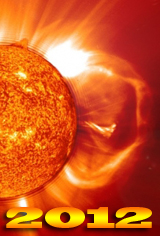A Possible Solar Storm in 2012?

Not long ago, a report quoting NASA scientists was issued by the National Academy of Science, the highest scientific advisory body to the United States Congress. The report said something that used to be unthinkable: our own sun could have a temper tantrum that would unleash a tsunami of radiation from outer space, potentially wiping out our space satellites, wiping out power lines, and leaving entire continents without power.
This means that your refrigerator and freezer wouldn’t have any electricity, leaving food to rot and creating food shortages around the world. Communication systems and power systems worldwide could be wiped out for months at a time. Something this large would cause not just a localized but rather a continent-wide power outage.
An event of this magnitude may seem hard to grasp, but just remember that every eleven years the sun flips with respect to its magnetic field (North becomes South and South becomes North) and releases a burst of radiation directed toward outer space, including Earth, and that this burst could endanger our communication systems. We forget that the space age is very young; we’ve only had a few of these sunspot cycles to worry about, and for the most part we have dodged the bullet.
Most of the radiation that has been emitted over previous cycles has missed the earth (thank goodness), but in 1859 there was a solar storm which paralyzed our telegraph wires and was the largest geomagnetic storm in recorded history. Back then we only had telegraph, and our telegraph wires were quite sturdy. From the damage done we can calculate how massive the solar storm was, and it was a whopper! In fact, if that solar storm of 1859 were to hit us today it would cause (according to the report) trillions of dollars in property damage and hundreds of billions of dollars in damage for each of the countries that were affected. Food riots would break out, governments could collapse…and there would be no cavalry coming to the rescue because the cavalry would also lose its power and ability to communicate. Transformers could get wiped out, meaning that whole continents would not have electrical power. We’d essentially be back to the way we were in 1859. Gone too would be the satellites controlling most of our luxuries today, including communication, television, radio, and the Internet where you are reading this very blog.
This is the nightmare scenario. So when might this happen? You guessed it: the year 2012, the next peaking of our sun’s solar cycle. The report, however, is careful to say that this may in fact not happen. It’s inevitable, however, that at some time or another it will happen again. Think about Katrina: prior to 2005, a lot of people knew that Katrina-type hurricanes could wipe out the levees in New Orleans. It was a well-known fact, but nobody did anything because everyone said “Let the next Administration—let the next sucker deal with it.” Well, unfortunately the next sucker was us, and we had to foot the multi-billion dollar bill of Katrina. Now scientists are saying that a possible Katrina from outer space—potentially many, many times more disastrous—could hit the earth, and it’s inevitable that it will happen.
So why not reinforce our satellites—and our power systems—today?
Much as with Katrina, it pays to do certain things now because we do face the inevitable. For example, even though satellites currently in outer space cannot be reinforced, the next generation of satellites should be reinforced to withstand the full brunt of the solar winds and solar flares. Also, on Earth, power stations and especially transformers should be insulated and reinforced so as to be able to withstand radiation coming from outer space. This is not rocket science; we know how to do it and the technology is already there—it’s just a question of political will. Some people say “Nah…I mean, it might happen in a few decades, but not on my watch.” Well, it will happen, and when it does…watch out!
For now, let’s hope we dodge another bullet the next time the sun decides to throw a temper tantrum.





